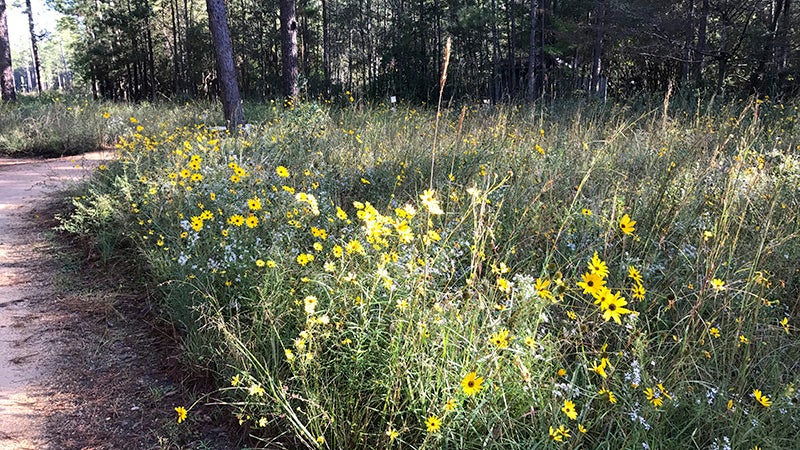Celebrating Nature at the Crosby Arboretum!
Published 7:00 am Wednesday, November 14, 2018

- These yellow swamp sunflowers can be found along the path in the Arboretum’s Savanna exhibit. Submitted photo
By Patricia R. Drackett, Director and Assistant Extension Professor of Landscape Architecture
The Crosby Arboretum, Mississippi State University Extension Service
Any season is a grand season to experience nature at the Crosby Arboretum. Endless opportunities abound, especially for those wielding cameras! We had great fun during several tours during the past few weeks around the Pond Journey and the Pitcher Plant Bog.
On the Pond Journey, three overlooks offer views of the Pinecote Pavilion, remarkably different changes in position offering separate perspectives of this structure. It seems impossible to take the same photo twice of the Pavilion, and its appearance changes dramatically throughout the day with the sun’s journey across the sky and the shifting shadow patterns on the brick floor.
In the Pitcher Plant Bog, fall grasses are unfurling. Tall plumes of sugar cane plume grass (Saccharum giganteum) and panic grass (Panicum virgatum) mix with seed-laden spikes of Liatris and the bright yellow blooms of swamp sunflowers (Helianthus angustifolius) and colorful clusters of yellow pitcher plants (Sarracenia alata), also known as pale pitcher plants.
Stems of spiked club moss twine around the bases of the pitcher plants, providing talking points during tours. The twisted groundcover resembles mossy antelope horns. Its Latin name is Lycopodium and it is also known as creeping cedar or ground pine. Club moss is what is called a “fern ally”. It is not a true fern, although like a fern, it doesn’t have flowers and reproduces by spores.
We like to tell the story to tour groups about the water-repelling qualities of Lycopodium spores. The powder was once used on the inside of medical gloves. Because of its highly flammable qualities, it is still used as flash powder by stage magicians. In “olden days”, Lycopodium powder was ignited to create the flash for taking portraits in photography studios. Search the Web to see examples of how Lycopodium powder is still used today in theater performances and science demonstrations, and read more about its historical uses in medicine.
By being able to participate in the many ways the plant communities evolve at the Arboretum throughout the year and by continuing to return to experience them, visitors become connected to the roller coaster of seasonal change within our exhibits. Ultimately, this can forge a lasting connection to the land itself.
Would you like to discover more about your camera so you can get the most out of recording the “moments” you encounter during time spent outdoors? Don’t miss the chance to join photographer Diana Thornton for a gentle Nature Photography Field Walk this Saturday, November 17 from 9:00 a.m. to Noon. Learn landscape, wildlife, and macro photography, and work on exposure settings, creative imagery, and finding your “eye”. Basic DSLR knowledge is required, as well as a DSLR camera, extra batteries and memory cards. Wear comfortable walking shoes, and bring a poncho in case of rain, bug spray, water, backpack or other way to carry your equipment easily on the trail. Recommended but not necessary: Tripod (small and light to bring on the trail unless you want to hire a sherpa), various lenses – i.e. macro, zoom, etc. (if you don’t have any others, Diane will show you how to work with the lens you have). The workshop is limited to 10 persons, so please register soon. Cost is $20 for members; and $25 for non-members.
Do you love to garden for wildlife, and in particular, butterflies? Lean how to fill your yard with monarch butterflies! Call to sign up for “Monarchs, Milkweed, and Nectar Plants for the Gulf Coast Region” on Saturday, November 17, 1:00 to 2:00 p.m. Amy Nichols, a passionate Monarch butterfly enthusiast, Mississippi Native Plant Society member, and Pearl River Master Gardener, will discuss the life cycle of Monarch butterflies, their migration, and the native milkweeds that support their larval (caterpillar) stage. She will also discuss the importance of including spring and fall nectar plants in your Gulf Coast garden, to support adult monarch butterflies. Reservations are requested. Please call to register.
A “Pinecones and Tree Cookies” children’s craft workshop will be held on two separate days this week. Kim Johnson will lead the workshops on Friday, November 16 from 10:00 to 11:30 a.m. and again on Sunday, November 18 from 2:00 to 3:00 p.m. All materials will be provided. There is no minimum age requirement, as children must be accompanied by an adult. We still have room in both workshops, please call 601-799-2311 to sign up. Members’ children $4; non-members’ children $6 (no charge for adults).
See www.crosbyarboretum.msstate.edu or visit the Arboretum’s Facebook page for more information. Visiting hours are Wednesday through Sunday from 9 to 5. Our public garden is located at 370 Ridge Road in Picayune, at I-59 Exit 4.



